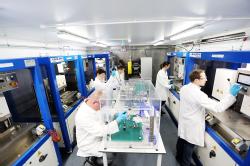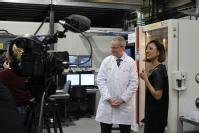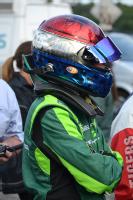Departmental news
WMG plays key role in £20 million announcement backing British Automotive battery manufacturing
 WMG at the University of Warwick are delighted to be part of a £19.4m project to support the development of next-generation electric vehicle batteries in the UK, funded through the Advanced Propulsion Centre (APC UK Ltd).
WMG at the University of Warwick are delighted to be part of a £19.4m project to support the development of next-generation electric vehicle batteries in the UK, funded through the Advanced Propulsion Centre (APC UK Ltd).
The funding will support leading edge manufacturing research focussed around Nissan's Sunderland battery manufacturing plant - the largest full scale automotive Li-ion battery manufacturing facility in Europe. WMG researchers will play a key role in helping Nissan take forward this opportunity and will receive £1m for the research.
The consortium led by Nissan with WMG at the University of Warwick, Hyperdrive, Newcastle University, and Zero Carbon Futures (ZCF), will bring together engineers, researchers, new technology and existing facilities, assets and knowledge to create and prove new and improved manufacturing processes for the next generation of automotive batteries.
WMG has particular skills around battery chemistry and the manufacturing processes used to scale this up to high volume production. WMG role in the project will be to investigate potential improvements to battery chemistry and increasing manufacturing yield, and to optimise automated manufacturing processes to enable Nissan to remain at the forefront of electric vehicle technology.
Fully Charged for Christmas
 Battery experts at WMG, University of Warwick have helped The One Show test AA batteries to determine which last the longest.
Battery experts at WMG, University of Warwick have helped The One Show test AA batteries to determine which last the longest.
More used to testing batteries for transport, including cars, trains and motorsport as it’s Christmas experts were more than happy to help reporter, Anita Rani with a scientific test to understand how a range of different AA batteries available on the high street might perform. The tests were carried out in WMG’s Energy Innovation Centre using the battery characterisation laboratory and part of the £13m Battery Materials Scale-Up Pilot Line.
Mark Amor-Segan, Principal Engineer and Shane Beattie, Technical Manager, for the Battery Scale-up FacilityLink opens in a new window, conducted blind scientific tests on 16 different AA batteries. The batteries came from three different battery chemistry families: i) zinc-chloride, ii) alkaline and iii) lithium. All 16 batteries were tested at a constant current of 500 mA down to 1.1 V. The voltage profile was recorded using a highly accurate battery cycler. All batteries were kept at 20 degrees using a thermal chamber to provide a controlled test environment. For The One Show viewers Anita came armed with 16 toy puppies and fitted each with the 16 different types of batteries. Keeping the puppies in a 20 degree room, the same temperature used to test the batteries, and watched over by a researcher, they were set off to see which would last the longest.
WMG congratulates Drayson Racing on new electric vehicle speed record
 On Tuesday 25 June, Drayson Racing’s lightweight electric racing car set a new world land speed record for an electric vehicle. The Lola B12/EV hit a maximum speed of 204.2mph (328.6kph) in its attempt at RAF Elvington in Yorkshire, breaking the previous record of 175mph which was set in 1974.
On Tuesday 25 June, Drayson Racing’s lightweight electric racing car set a new world land speed record for an electric vehicle. The Lola B12/EV hit a maximum speed of 204.2mph (328.6kph) in its attempt at RAF Elvington in Yorkshire, breaking the previous record of 175mph which was set in 1974.
Over the last 6 months, WMG has worked with Drayson Racing on the car’s development, drawing on WMG’s expertise in sustainable materials and energy management.
WMG researchers developed recycled carbon fibre panels which were used on the Drayson car, research which was the result of a WMG EPSRC Challenging Engineering grant. Through WMG’s Energy Innovation Centre, testing and characterisation work was carried out on the vehicle’s electric motor to enable the maximum power possible to be achieved. This helped to contribute to the success of the Drayson racing vehicle.
